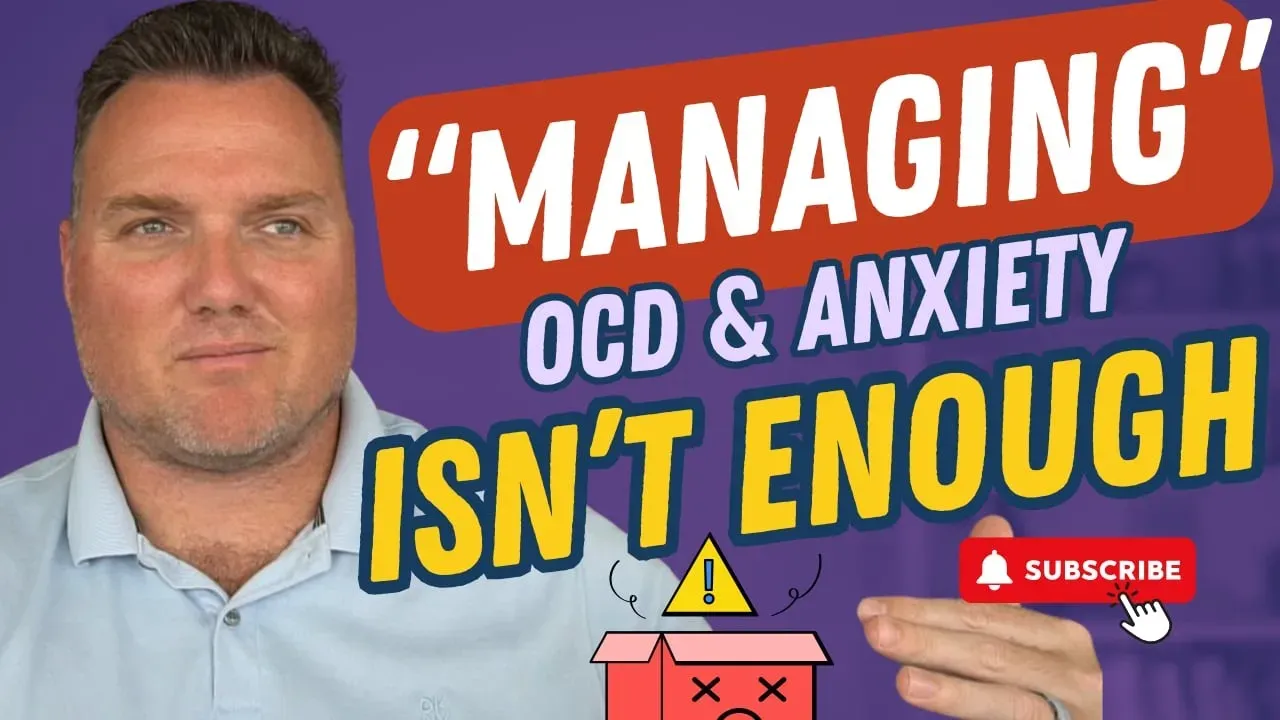Why Managing OCD & Anxiety Keeps You Stuck — And What to Do Instead
May 20, 2025
Why “Managing” OCD & Anxiety Isn’t Enough: What Actually Works for True Freedom
By Matt Codde, LCSW
If you’ve ever found yourself trapped in the cycle of managing OCD and anxiety—constantly seeking out ways to reduce the symptoms, avoid triggers, or simply get through the day—you’re not alone. But what if I told you that this approach might actually be making things worse in the long run? As both a survivor of anxiety loops and a licensed clinical social worker, I’m passionate about helping you break free, not just survive. Let’s dive into why managing symptoms is not the solution and what you can do instead to reclaim your life.
The Problem With “Managing” OCD & Anxiety Symptoms
On the surface, managing symptoms sounds logical: feel anxiety, do something to ease it (avoid a trigger, meditate, breathe deeply). Many of us build complex routines, safety behaviors, and rituals with the hope that we can eliminate uncomfortable thoughts and feelings. But here’s the catch: every time you try to “manage” these symptoms, you’re sending a message to your body and mind that anxiety, intrusive thoughts, or uncomfortable feelings are dangerous.
This creates a dangerous feedback loop. You compulsively avoid, soothe, or seek reassurance, which only reinforces the belief that these normal human experiences are threatening. Your life starts shrinking. Maybe it’s skipping a social event, not going out to that restaurant, or avoiding that job opportunity. Over time, your world gets smaller and smaller, all in the name of “managing” anxiety.
Why Management Feeds the OCD/Anxiety Loop
When your whole life revolves around not having unwanted feelings or thoughts, you condition your nervous system to interpret those feelings as threats. That leads to more compulsions—and the loop gets tighter. You might feel okay temporarily, but you end up dedicating more of your day to symptom management, creating strict routines just to get by. For example, maybe you now need a two-hour sleep routine because you once had anxiety at bedtime. The real tragedy? Your life becomes about avoiding discomfort, not actually living.
Surviving vs. Living: A Powerful Mindset Shift
Managing symptoms keeps you surviving, but are you really living? There’s a huge difference. Survival mode means you exist within the limits defined by fear and avoidance; living means embracing the full spectrum of human experience—including anxiety and uncomfortable thoughts.
True change happens when you challenge the belief that you shouldn’t feel certain feelings or have certain thoughts. It’s not about making emotions go away; it’s about becoming someone who can handle them. When you learn to sit with discomfort, face fears without compulsions, and let emotions pass, you start to reclaim your freedom. You become someone bigger than the symptoms.
How to Break the OCD & Anxiety Loop
-
Shift the Goal: Stop asking, “How do I get rid of these thoughts or feelings?” and start asking, “How do I become the kind of person who can experience this without being controlled by it?”
-
Challenge the Loop: See compulsions for what they are: attempts to avoid discomfort that ultimately reinforce it. Interrupt the pattern by allowing the feelings to be present without judgment.
-
Practice Non-Resistance: Instead of resisting anxiety, allow it. Notice the feeling, acknowledge it’s uncomfortable, but don't engage in the rituals or avoidance behaviors.
-
Focus on Living: Ask yourself if your choices are helping you truly live, or just survive another day. Take small steps outside the loop—go to the event, order the food, take the drive.
-
Grow Beyond the Symptoms: The ultimate goal isn’t to be symptom-free—it’s to stop fearing the symptoms. When you see them as normal human experiences, they lose their power.
Conclusion: Thrive, Don’t Just Survive
The philosophy at Restored Minds isn’t about symptom management; it’s about helping you become a person who isn’t disrupted by intrusive thoughts or anxiety. Freedom comes from no longer seeing these experiences as threats, but as part of the human condition. When you stop trying to manage your symptoms and start growing beyond them, life opens up again.
If you found this helpful, please share it, subscribe, and check out the resources below to take the next step. Remember: it’s not about making it through the day, it’s about truly living the kind of life you want.


